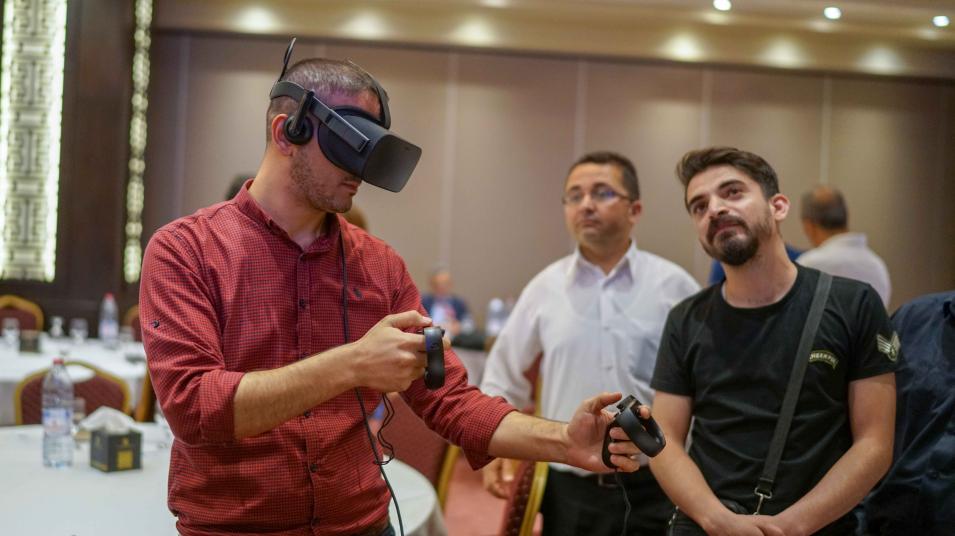Palestine Techno Park showcases Virtual Reality technology for Palestinian education and industry
On July 25, Ramzi Hassan, an associate professor at the School of Landscape Architecture at the Norwegian University of Life Sciences was the guest speaker at the Palestine Techno Park workshop on Virtual and Augmented Reality (VAR).
The workshop entitled “Introduction to Virtual and Augmented Reality” discussed the opportunities available in Palestine for implementing and implementing VAR technologies and assignments in the Palestinian market, through an integrated program named “Developing Augmented Reality/Virtual Reality and Mixed Reality Innovation Lab.”
The program addresses and promotes virtual augmented reality technologies through its REVAMP AR/VR Boot Camp, launched by Palestine Techno Park in cooperation with Palestinian Market Development Program (PMDP), funded by the UKaid and European Union in cooperation with the Ministry of National Economy and Birzeit University. The project aims to introduce, support and incubate new technologies in Palestine.
Birzeit University President and Chairperson of Palestine Techno Park Abdullatif Abuhijleh, Market Development Lead at Palestine Market Development Program (PMDP) Arsalan Faheem, and Chairman of the Palestinian Information Technology Association of Companies (PITA) Yahya Al Salqan attended the event.
In his opening remarks, President Abuhijleh talked about the university’s experience and response to the revolution that is occurring to in Information Technology (IT) sector and the universal digital revolution. “Birzeit University redefined digital and modern education, learning, and development for the industry through an early focus on Virtual Reality technology as a learning and training aid. We started working on the Virtual Reality Lab, a collaboration between Birzeit University and Prof. Hassan, which finally became within reach in 2007.”
Abuhijleh pointed out that the Palestine Techno Park, hosted at Birzeit University, demonstrates the university’s strong belief in the role of revolutionary approaches to teaching and learning. “Through the Techno Park, Palestinian youth and entrepreneurs now have the opportunity to experience technologies and see possibilities that meet their needs and their communities. The park is an opportunity for bolstering our youth’s skills in the field of technology and informatics.”
Alaa’ Alaa’ Edin, a member and founder at the Palestine Techno Park said that this project hopes to find practical solutions to develop the IT sector in Palestine and enhance the spirit of innovation among the youth. He pointed out to the importance of creating new ideas that is implementable and can enhance the technology sector in Palestine. This can be further empowered through supporting technology entrepreneurship programs, launching new technology start-ups and social enterprises. Alaa’ Edin assured that the Techno Park is a national platform for all Palestinians, and is looking forward to opening relevant boot camps in other Palestinian universities.
Salqan talked about the role of the private sector in leading the ICT sector towards an innovation-based economy, through implementing the latest technology in Palestine and use it to boost Palestine’s economic growth and its intellectual capital.
Guest speaker Hassan introduced VAR’s evolution throughout history to become one of the hottest emerging technologies in the industry today. He explained how his interest grew until he believed that virtual reality could be used as an effective tool for communication.
Hassan, a former lecturer and chair of the Department of Architecture at Birzeit University, spoke in the workshop how the technology of VAR can benefit Palestine and provide added value as an edutainment - entertainment with an educational aim.
The Boot Camp is a conceptual and technical learning process that seeks to develop business-driven virtual reality ideas and solutions to be developed in the local and international market in collaboration with other partners in Palestine such as universities, governmental institutions, and NGOs. The camp is a six-month program that hosts 24 students, graduates, innovators, and employees from the private sector.







